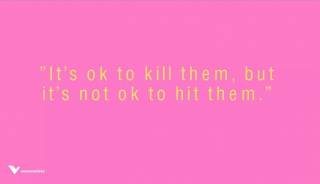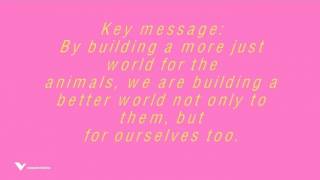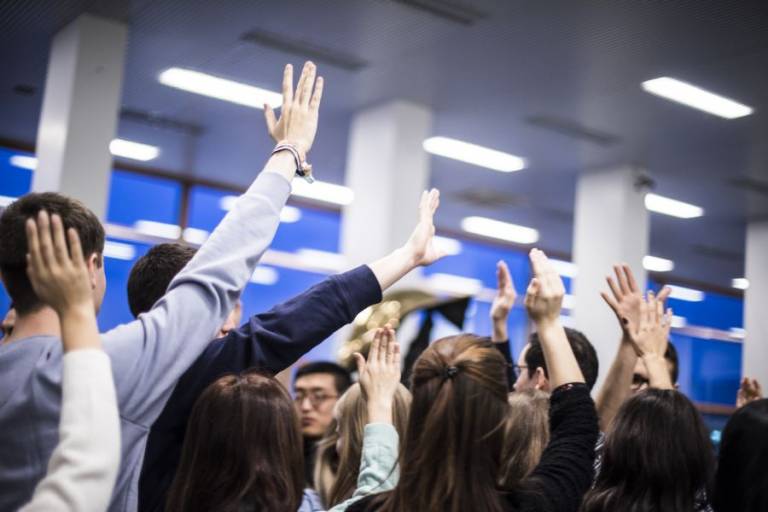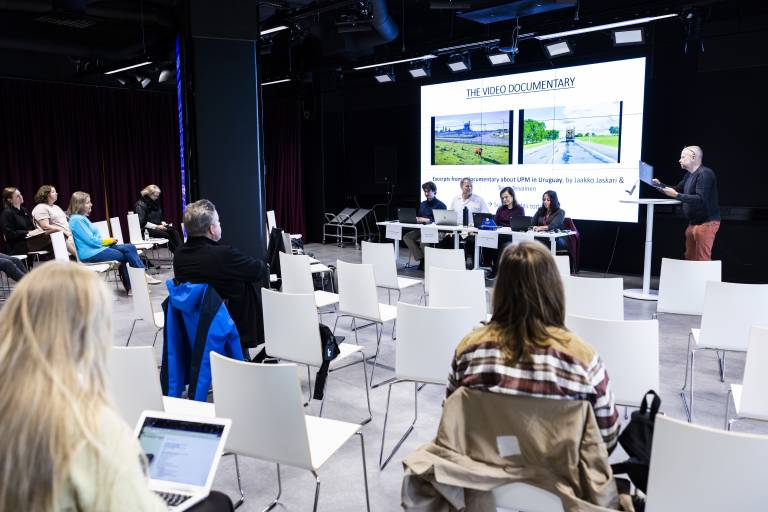Although actively engaged with NGOs and activist work from a young age, Mai Kivelä never believed that she would one day be in politics. Today her party, the Left Alliance, has 16 members in the Finnish parliament and it deals actively with ecological and social justice issues, holding a particular interest in sustainability.
 The first part of the lecture was titled “Us and other animals” starting with a phrase, “It’s ok to kill them, but it’s not ok to hit them”. As intimidating as the sentence sounds, Mai Kivelä emphasized that animal rights are indeed a complex and controversial issue. Although animals are the majority in the world, they also remain mostly hidden amid human interaction, while humans produce and use animals more than ever in the history. At the same time, currently people also care about animals and consider them as their companions and loved pets.
The first part of the lecture was titled “Us and other animals” starting with a phrase, “It’s ok to kill them, but it’s not ok to hit them”. As intimidating as the sentence sounds, Mai Kivelä emphasized that animal rights are indeed a complex and controversial issue. Although animals are the majority in the world, they also remain mostly hidden amid human interaction, while humans produce and use animals more than ever in the history. At the same time, currently people also care about animals and consider them as their companions and loved pets.
According to Mai Kivelä, classification of animals is very important in the society, as treatment and regulation of an individual animal largely depends on its classification. However, this classification is related to how people want to use the animal. Hence, often this classification is neither biological nor scientific. People classify animals as pets, farm animals, fur animals, wild animals, lab animals, and yet many species fit multiple categories, like rabbits. As mentioned above, this classification does not derive from biology, but from the power of habits and practices, and what we are used to seeing as being ‘normal’. Our judgment is also largely influenced by the economic factors, cultural aspects, media, literature, movies, and religion.
 The second part of the LFC Lecture addressed the question: why would animal rights be an issue? Mai Kivelä pointed out that just in Finland, 90 million animals die in slaughterhouses every year despite the fact that animals are not ‘things’ or property as they feel pain, pleasure, fear and joy. Since animals have these feelings, they should have the right to possess well-being regardless of the classifications that humans give them. Just as human individuals, animals have intrinsic value and certain rights. An animal has the right to be an animal, the right to live and the right to die without unnecessary pain and suffering. These rights can also be categorized into positive rights and negative rights. Positive rights imply that the interests of animals are being considered, while negative rights mean that animals are not being exploited. Although animals are not instruments and people don’t have the right to use them, the dangerous idea of Speciesism gives people the moral crown to utilize other species. This is menacing as the laws regarding animals are based on our moral thinking. Animals have rights that are relevant to them, and people have certain obligations towards other animals.
The second part of the LFC Lecture addressed the question: why would animal rights be an issue? Mai Kivelä pointed out that just in Finland, 90 million animals die in slaughterhouses every year despite the fact that animals are not ‘things’ or property as they feel pain, pleasure, fear and joy. Since animals have these feelings, they should have the right to possess well-being regardless of the classifications that humans give them. Just as human individuals, animals have intrinsic value and certain rights. An animal has the right to be an animal, the right to live and the right to die without unnecessary pain and suffering. These rights can also be categorized into positive rights and negative rights. Positive rights imply that the interests of animals are being considered, while negative rights mean that animals are not being exploited. Although animals are not instruments and people don’t have the right to use them, the dangerous idea of Speciesism gives people the moral crown to utilize other species. This is menacing as the laws regarding animals are based on our moral thinking. Animals have rights that are relevant to them, and people have certain obligations towards other animals.
Part three of the lecture focused on the outdated regulation of animal rights. Although violations of animal rights mostly occur in slaughterhouses, there are also problems with monitoring and the way animals are held. Some examples of bad treatment of animals include the usage of anti-rotation cages for pigs and tie-stall barns for cows, which makes these animals disabled to express their natural behaviour as their movements are limited. Carrying out painful procedures without appropriate pain relief and management is still allowed, and so are disbudding of calves and castration of pigs. Also, animals are exposed to bad breeding practices and deprivation of continuous access to drinking water. Furthermore, registration and identification marking of dogs and cats are still not mandatory practices. These matters should be recognized more widely, and when welfare issues are better ensured and exploitative practices end, it would take us closer to living in a sustainable world with other species.
In the fourth part of the lecture, Mai Kivelä emphasized the role of animal rights in making a sustainable future. The risks that are present due to the current intensive use of animal-based food production are clear. Examples of these risks caused by animal farming are the spread of pandemics like COVID-19 and antibiotic-resistant bacteria. Other evident threats caused by intense animal-based food production can be seen in the massive amounts of natural resources that it requires. Other types of challenges lie in the fact that animal mass slaughtering is widely accepted, which normalizes not only the use of violence on animals, but also violence more widely in societies. This makes animal violence an issue of social justice, which must be strongly addressed. Mai Kivelä expressed that our moral judgments cannot simply ignore animal matters. Thus, there is a need for more regulation on animal matters in the society. Also, individuals should take responsibility for their everyday choices.
 The topic of animal rights provides us with the possibility and potential to change our future. Mai’s key message was clear: “By building a more just world for the animals, we are building a better world not only to them, but for ourselves too.” By understanding the interdependency of nature and humans, we realize that animal rights are a crucial part of creating a sustainable future where nature and humans can co-exist.
The topic of animal rights provides us with the possibility and potential to change our future. Mai’s key message was clear: “By building a more just world for the animals, we are building a better world not only to them, but for ourselves too.” By understanding the interdependency of nature and humans, we realize that animal rights are a crucial part of creating a sustainable future where nature and humans can co-exist.
In the last part of the lecture, Mai Kivelä answered to the questions from the organizing team and the audience. First, the discussion was drawn on the advertisement of products and services, which are known to harm the environment. While the process is still ongoing, there are positive global and local signals of more responsible advertisement in public spaces. The discussion then shifted to the effects of the COVID-19 pandemic on animal treatment and animal industry. While the pandemic has hit the animal industry hard globally, Kivelä addressed that the pandemic will probably also result in people taking the matters of the animal industry and their effect on human health more seriously, which can be seen as a positive implication.
While animals cannot advocate for themselves, humans must do so. Currently, there are still powerful advocates and agricultural subsidies that support the current animal-based food system, and the transformation of the overall food system is still not evident. Thus, the role of citizens in promoting animal rights and societal transformation is important. Although change is already taking place in the politics and business sector, for example in terms of plant-based food production, there is still a need for political and external pressure on animal matters from the consumer’s perspective.
The discussion then moved on to alternatives for animal testing, which is largely used in medicine. Mai Kivelä expressed that although animal testing could not be banned at once, there is already relevant technical expertise in Finland that utilizes the possibility of creating alternative methods for testing. Mai also addressed that changes in the Animal Welfare Act may change the situation on animal rights to some extent, but radical changes cannot be expected at once.
Lastly, the conversation shifted to consideration of the balance between animal rights and human needs. Mai Kivelä noted the acute need to actively reflect and consider the necessities of human action and the balance of animal rights and their suffering against the needs of humans. Animal rights are profoundly a societal discussion on our moral values and what we consider accepted. It goes deep into the way we are institutionalized and what kind of influences we have been accustomed to. For example, the school lunch system can affect the way we view plant-based food.
Animal rights are not merely a matter of habit and culture, but a matter of sustainability, which requires our careful consideration if we want to build a more sustainable future. Still, the contradiction in human action is evident.
As the final session of the Leadership for Change Lectures speaker series during this academic year, we were more than happy to turn our attention to the important topic of animal rights in a sustainable society. On behalf of the organizing team, active audience and the LFC master’s degree programme, we want to thank Mai Kivelä for the thought-provoking presentation and active engagement with our questions. We wish her all the best with her active efforts for animal rights and a more sustainable society!
You can listen to the previous LFC Lectures here.
The LFC Lecture with Mai Kivelä was organized by Antti Kinnunen, Bianca Diniz Salvatori, Bohui Lian, Hyeseong Kim, Joona Tornberg, Laura Naud and Tiia Tuovinen.
The blog post was written by Joona Tornberg and Hyeseong Kim.




